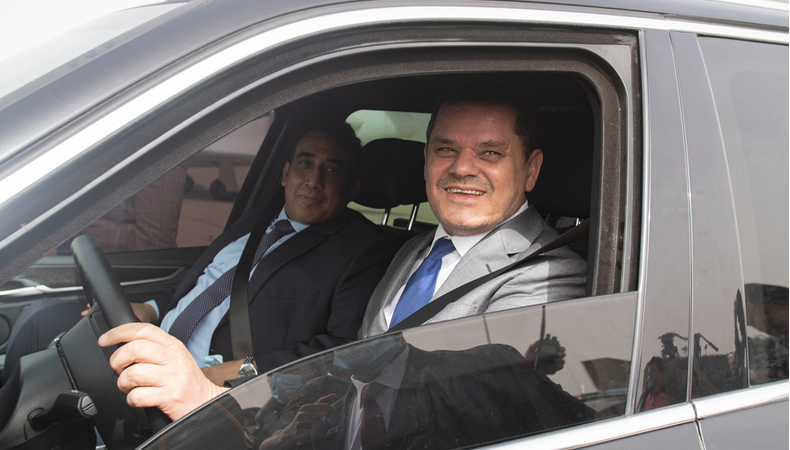The elections in Libya turn into a war of appeals between candidates


The most important candidates are at the center of legal disputes over their candidacy, conflicts triggered by appeals presented in the country’s various courts. The current Prime Minister Abdul Hamid Dbeibah is contested by other candidates. The Tripoli Court suspended his candidacy after the appeal of other candidates. He and his lawyer’s presented opposition to the appeals.
Those who opposed the premier’s name are the presidential candidates Aref Ali Nayed (a former ambassador and Islamic scholar), Othman Abdel Jalil, Mohamed al Muntasser, and above all, the former interior minister Fathi Bashagha. All the applicants cite the electoral law, which requires candidates to suspend themselves from public office, civil or military, three months before the vote. Furthermore, when he was designated prime minister in February, Dbeibah accepted the post with the commitment not to run for election. His appointment resulted from a sort of national truce agreement set up to reunite western Libya, of Tripolitania, with Cyrenaica controlled by General Haftar.
Furthermore, Dbeibah would have Canadian nationality (he studied engineering in Canada), and Libyan law prohibits elective positions for dual citizenship. Dbeibah, on November 18, presented his candidacy to the Electoral Commission of Tripoli. He is considered one of the strongest candidates because he is the premier in office and can manage part of the state budget. Above all, he can play with announcements to the population his government has made numerous in recent weeks.
The first notable leader in presenting his candidacy 15 days ago was Saif al Islam Gaddafi. The second son of the colonel, who seemed to be destined to inherit his father’s power, after years first of imprisonment and then of self-exile in the town of Zintan, had decided to present his candidacy. However, the National Electoral Commission immediately rejected his name: his judicial status in Libya is still uncertain, but above all, Gaddafi is still under indictment in the International Criminal Court in The Hague.
Saif filed an appeal with the court in Sebha, the capital of southern Libya, where he signed up for the candidacy. But the city appeals court judges would have refused to hear his lawyers’ appeal. Saif on Facebook wrote that the magistrates might have been intimidated. On Thursday 25, Gaddafi’s lawyers tried to appeal to the Court of Appeal, but the “Tariq Bin Ziyad” brigade, an armed group, led by Saddam Haftar, son of General Khalifa Haftar, surrounded the court, blocking the magistrates and preventing lawyer Khaled Al Zaydi from filing an appeal.
There is a fascinating political element to record about Saif’s candidacy: Russia has publicly expressed “concern” to exclude “prominent personalities” from the candidacies. And the personality that interests Moscow is precisely that of Saif: it was the spokesperson of the Moscow Foreign Ministry, Maria Zakharova, who took an interest in the case. Zakharova argued that Saif’s exclusion represents “discrimination that raises some concern,” adding that Saif al Islam “is popular according to opinion polls. “We always ask to provide equal opportunities to representatives of all Libyan political and public circles to participate in the electoral process.”
Indeed, for years the Russian Foreign Ministry and the security services had organized an efficient campaign of political support for the colonel’s son. The Tripoli government arrested two Moscow envoys three years ago because they had started a mobilization campaign in Tripolitania, creating Facebook sites and setting up a series of contacts with former Gaddafi supporters to relaunch Saif’s possible candidacy.
The third notable candidate of these elections is certainly General Khalifa Haftar, who presented his candidacy to the headquarters of the Electoral Commission in Benghazi. On the other hand, the Court of Appeal of the Eastern capital has rejected an appeal presented by another presidential candidate, Abdel Majid Saif Al Nasr. It is not clear what the reasons for the request were, but above all, it is not clear why the judges rejected the appeal.
Haftar also has dual citizenship (Libyan and American), which is an obstacle to his candidacy. But politically, the general is the man who, for two years, imposed a new bloody period of war on cowardice to the country, with the attack launched against Tripoli in an attempt to conquer the country’s capital. His candidacy is deeply divisive in Libya, but he certainly has the support of essential parts of the country’s civil society as well. According to Libyan law, the real reason for the legal obstacle would be only the dual citizenship of the general, a reason for exclusion from the candidacies. The game of appeals is therefore still fully open, and the road to elections will be bumpy. But if he still manages to get to the vote without violence for Libya, it will be a great success.




